2024.9.4 Woman carjacked at Dearborn credit union by 18-year-old. A Friday morning trip to Zeal Credit Union on Michigan Avenue ended with a gun in her face.
Woman carjacked in Dearborn by 18-year-old suspect because he was ‘sick of walking’
Woman carjacked at Dearborn credit union by 18-year-old
A Friday morning trip to Zeal Credit Union on Michigan Avenue ended with a gun in her face.
DEARBORN, Mich (FOX 2) – A 72-year-old woman was carjacked at gunpoint in Dearborn – by an 18-year-old.
She is physically ok – but says this changes her entire life, she’s always watching her back now.
The suspect, Isaiah Marcellus Jones, would later tell police he was “sick of walking” and decided to carjack the elderly woman.
“I thank God that I’m alive,” says the woman, who we’ll call “Deborah.”
She was carjacked after the man, who was hiding from behind a trashcan, ambushed her at an ATM.
“It was very scary, very traumatic,” she said. “I just got so nervous, the most nervous I’ve ever been in my life.”
A Friday morning trip to Zeal Credit Union on Michigan Avenue ended with a gun in her face.
“He had the gun in his hand and first thing he said, give me your keys and I said ‘Please don’t hurt me. Please don’t shoot me,’” she said.
He demanded her car keys, and purse – then wouldn’t let her grab her cell phone.
Police say Jones drove off leaving “Deborah” stranded, to walk a half-mile to the only store open – for help.
“My purse can be replaced, but my life cannot be replaced,” she said.
Dearborn police quickly zeroed in on Jones. They surveilled him, then moved in for the arrest in Southfield the same day.
Officers recovered the gun he allegedly used to terrorized Deborah, too, said Police Chief Issa Shahin.
“People who prey on the vulnerable and prey on the elderly and children – I agree with you, Jessica, they’re dangerous,” Shahin said. “And we need to make sure and protect our community and our officers from those individuals.”
Jones was arraigned Sunday – given a $50,000 personal bond by 36th District Magistrate Malaika Ramsey-Heath. This meant he wouldn’t have to put any money up to get out of custody.
“A personal bond for a violent offense like this is extremely rare and it’s out of the ordinary,” Shahin said.
Dearborn police are extremely concerned and confused by that decision – given the allegations.
“It’s a capital offense, the penalties in the state of our life imprisonment,” Shahin said.
Dearborn’s Chief Judge Sam Salamey held an emegrency hearing Monday before Jones was let out, changing his bond to $50,000 cash. He remains in custody.
It provided some comfort for Deborah who says her life is just different now.
“I’m terrified now, I am paranoid,” she said. “I look around everywhere I go now.”
Magistrate Ramsey-Heath has made headlines for a similar low bond situation back in 2022 for a shooting. The chief judge, at 36th District Court, William C. McConico, had no comment on the carjacking, the case, or the low bond that was set.

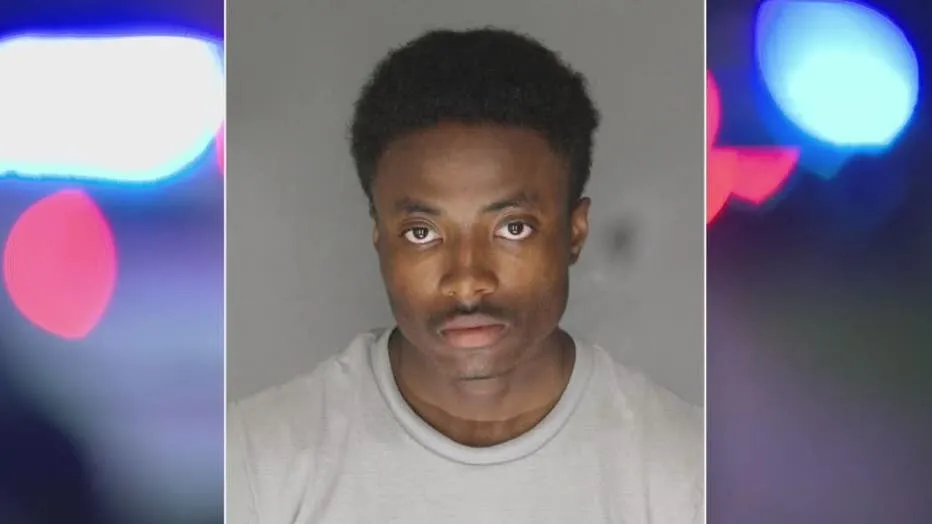
—
一名 18 岁嫌疑人在迪尔伯恩劫持了一名女子的汽车,理由是“他厌倦了走路”
发布日期 :2024 年 9 月 4 日,晚上 11:34(美国东部夏令时间)
一名 72 岁的妇女在迪尔伯恩被一名 18 岁少年持枪劫车。
她的身体状况还好,但她说这改变了她的整个生活,她现在总是小心翼翼。
嫌疑人以赛亚·马塞勒斯·琼斯 (Isaiah Marcellus Jones) 后来告诉警方,他“厌倦了走路”,并决定劫持这名老年妇女的车。
“感谢上帝让我还活着,”这位我们暂且称她为“黛博拉”的女子说道。
一名男子躲在垃圾桶后面,在自动取款机前伏击了她,随后她的车就被劫持了。
“这太可怕了,太令人难受了,”她说。“我太紧张了,这是我一生中最紧张的时刻。”
周五早上,她前往密歇根大道的 Zeal 信用合作社时,却遭遇了一起枪击事件。
“他手里拿着枪,第一句话就是‘把钥匙给我’,我说‘请不要伤害我。请不要开枪打我’,”她说。
他要求她交出车钥匙和钱包,但不让她拿手机。
警方表示,琼斯开车离开,留下“黛博拉”独自一人,步行半英里到唯一一家开着的商店寻求帮助。
她说:“我的钱包可以被替换,但我的生命无法被替换。”
迪尔伯恩警方迅速锁定了琼斯。他们对他进行了监视,并于当天赶赴南菲尔德逮捕了他。
警察局长伊萨·沙欣 (Issa Shahin) 表示,警察还缴获了他据称用来恐吓黛博拉的枪。
“那些以弱势群体、老年人和儿童为目标的人——我同意你的观点,杰西卡,他们是危险的,”沙欣说。“我们需要确保保护我们的社区和我们的警员免受这些人的侵害。”
琼斯于周日接受传讯——第 36 区治安官 Malaika Ramsey-Heath 向他支付了 5 万美元的个人保释金。这意味着他无需支付任何费用即可获得保释。
沙欣说:“像这样的暴力犯罪以个人名义进行担保的情况极其罕见,而且很不寻常。”
考虑到这些指控,迪尔伯恩警方对这一决定极为担忧和困惑。
沙欣说:“这是死罪,在我们州的刑罚是终身监禁。”
周一,迪尔伯恩首席法官萨姆·萨拉米在琼斯获释前举行了紧急听证会,将他的保释金改为 5 万美元现金。他目前仍被拘留。
这给黛博拉带来了一些安慰,她说她的生活现在完全不一样了。
“我现在很害怕,我很偏执,”她说。“我现在走到哪里都会四处张望。”
2022 年,治安法官拉姆齐-希思 (Ramsey-Heath) 因枪击案发生类似的低保释情况而登上头条新闻。第 36 区法院首席法官威廉·C·麦科尼科 (William C. McConico) 对这起劫车案、案件或设定的低保释金没有发表评论。
2024.9.4 $500 Reward. This suspect broke into a home through the back window, and stole money while he was inside.
Detroit Police Department(DPD,底特律警局)
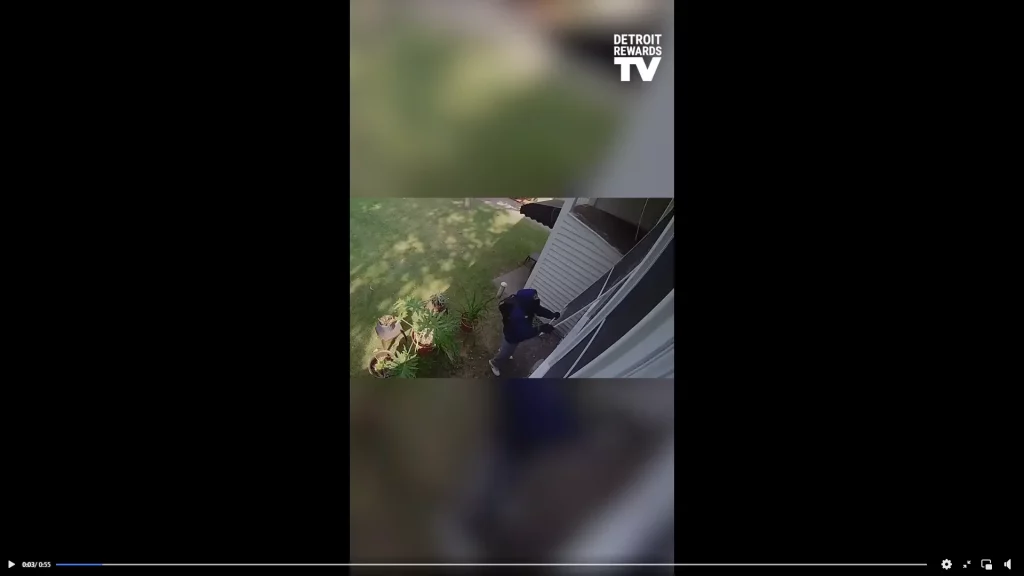
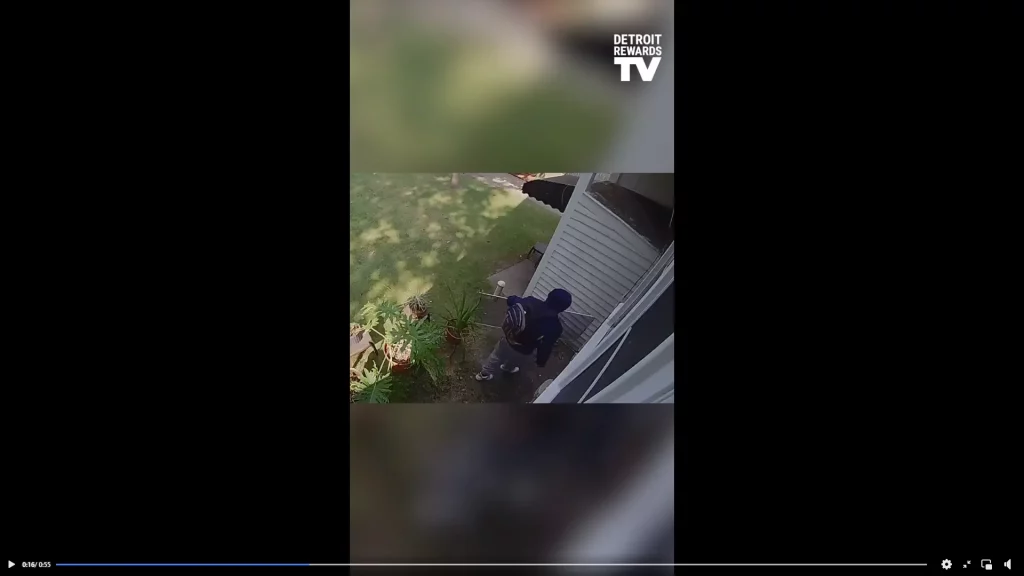
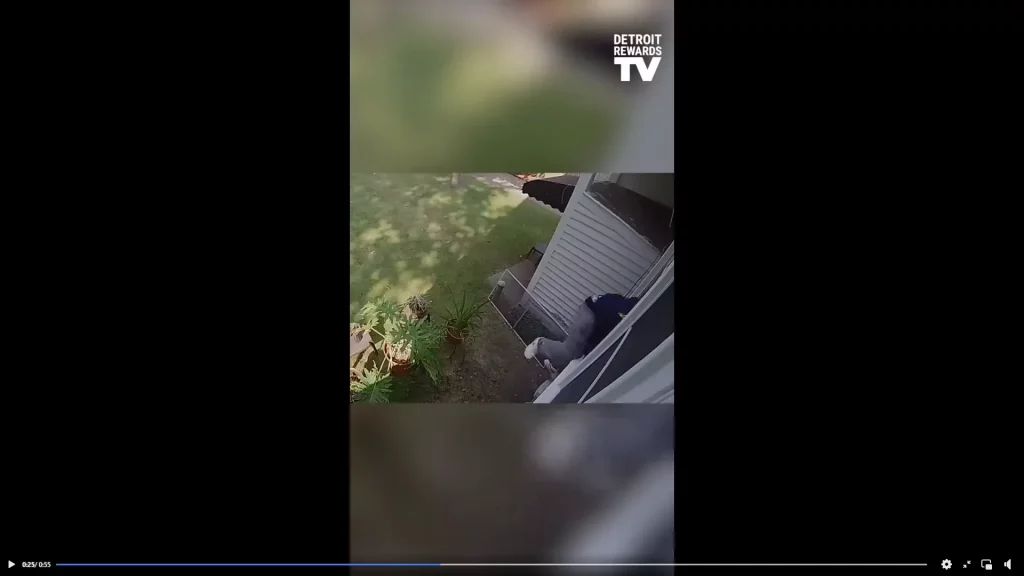
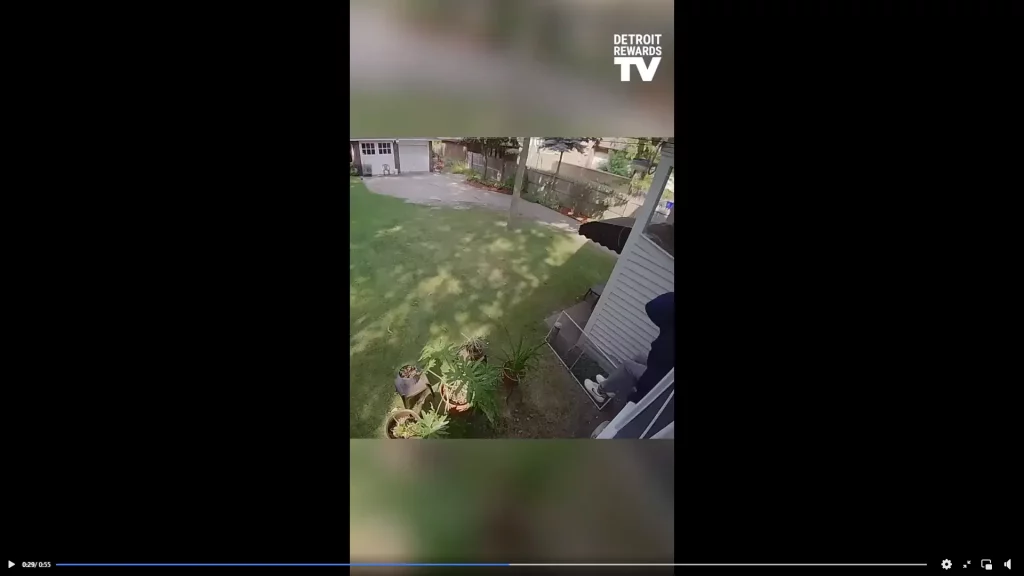
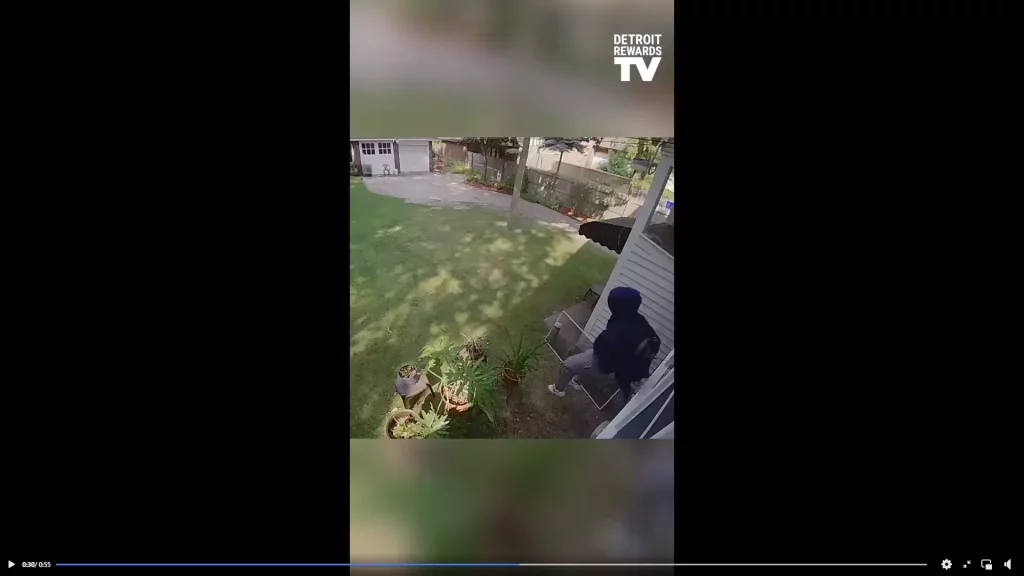
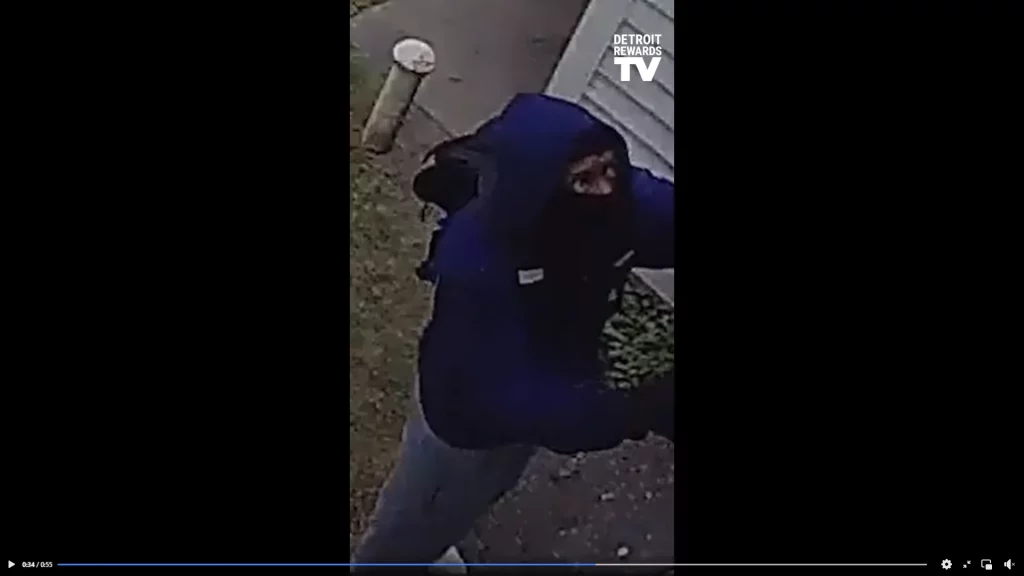
TIP TUESDAY
HOME INVASION
WHEN: 08/14/24
WHERE: 3000 block of Iroquois
This suspect broke into a home through the back window, and stole money while he was inside. The suspect then fled the scene on foot through the backyard. He is described as a male, 20-35, last seen wearing the clothing shown. No one was home at the time of the incident.
Case number must be included in your tip: 2408140149
If you have any information regarding this case please call 1-800-SPEAKUP or visit: DetroitRewards.TV to submit a tip.
—

入室盗窃
时间:08/14/24
地点: 易洛魁人 3000 街区
这名嫌疑人从后窗闯入一所房屋,并在屋内偷走了钱财。嫌疑人随后徒步穿过后院逃离现场。他被描述为一名 20-35 岁的男性,最后一次露面时穿着图中所示的衣服。事发时家中无人。
您的消息中必须包含案件编号:2408140149
如果您有任何有关此案的信息,请致电1-800-SPEAKUP或访问:DetroitRewards.TV 提交。
2024.8.30 The Metropolitan Police Department announces the arrest of a suspect involved in a Northeast burglary.
MPD Makes Arrest in Residential Burglary
Friday, August 30, 2024
The Metropolitan Police Department announces the arrest of a suspect involved in a Northeast burglary.
On July 22, 2024, at approximately 3:00 a.m., officers responded to the 1300 block of Orren Street, Northeast for a report of a burglary. The victim reported that a suspect unlawfully entered her residence. While inside, the victim stated that the suspect destroyed and stole items from the residence.
As a result of result of the detectives’ investigation, 24-year-old Alia Butler, of Northwest, D.C., was arrested and charged with Burglary Two.
—
The Metropolitan Police Department (華盛頓哥倫比亞特區的大都會警察局(MPD)) 逮捕入室盗窃嫌疑人
2024 年 7 月 22 日凌晨 3 点左右,警方接到奥伦街东北部 1300 号街区入室盗窃的报告。受害者报告称,一名嫌疑人非法进入了她的住所。受害者称,嫌疑人在屋内破坏并偷走了住所内的物品。
根据侦探的调查结果,来自华盛顿特区西北部的24 岁 Alia Butler被逮捕,并被指控犯有二级入室盗窃罪。
1966.4.2 Chicago Police Department Annual Reports 1965
Chicago Police Department Annual Reports 1965
Summary data on numerous topics including index, violent and property crime; case clearances; murder; firearms; arrests; city of Chicago population; domestic violence; traffic safety; juveniles; hate crimes; personnel; and calls for service.
https://home.chicagopolice.org/wp-content/uploads/2014/12/1965-Annual-Report.pdf
—
芝加哥警局年度报告 1965年
关于众多主题的汇总数据,包括犯罪指数、暴力和财产犯罪;案件结案;谋杀;枪支;逮捕;芝加哥市人口;家庭暴力;交通安全;青少年;仇恨犯罪;组织人事;服务呼叫。
2024.8.26 CPD(Chicago Police Department) Citywide Crime Statistics Week 34
Chicago Police Department
CompStat
Week 34
Report Covering the Week of 19-Aug-24 Through 25-Aug-24
—
芝加哥警局 全市犯罪统计数据周报 第34周(2024.8.19-8.25)
2024.8.26 The NYPD provides overall citywide statistics, which are updated weekly. Report Covering the Week 8/19/2024 Through 8/25/2024
Citywide Crime Statistics
The NYPD provides overall citywide statistics, which are updated weekly. The reports can be viewed below. The department’s advanced digital version can be viewed at CompStat 2.0.
City Wide Crime Statistics Weekly (PDF)
—
纽约全市犯罪统计数据-全市犯罪统计周报(2024.8.19-8.25)
纽约警察局(NYPD)提供全市总体统计数据,每周更新一次。
2024.8.21 Two people from Southern California allegedly running a scam involving tampered retail gift cards were arrested in Santa Clara County last weekend, police said Wednesday.
Campbell Police Department(坎贝尔警察局)
Wednesday August 21st, 2024

Recent Arrests: Tampered Gift Card Scam
On Saturday, August 17, CPD officers were dispatched to a report of a male suspect, later identified as Jian Chen, 45 years old of Rosemead, who was placing tampered gift cards on a store stand for customers to purchase. A second female suspect, Bifeng Xie, 32 years old of Riverside, waited in a car as Chen exchanged the altered gift cards. Chen and Xie had stolen empty gift cards to retrieve card numbers and pin information before replacing them inside stores.
A search of Chen and Xie’s vehicle revealed they had well over 500+ gift cards to various retailers such as Home Depot, Apple, and Amazon throughout their car. Both Chen and Xie were arrested and booked at Santa Clara County jail for obtaining money under false pretenses and conspiracy to commit a crime. During this process it was revealed that Chen also matched a suspect description for the same crime out of Santa Clara.
When a customer unknowingly loads money onto tampered gift cards, the scammers are able to drain the card’s balance before the recipient has a chance to use it. As these gift card scams become increasingly popular, we want to remind our community how they can protect themselves from falling victim to these scams.





—
Gift card scam suspects from Southern California arrested in Santa Clara County
Two people from Southern California allegedly running a scam involving tampered retail gift cards were arrested in Santa Clara County last weekend, police said Wednesday.
Campbell police said in a community alert that officers responded on August 17 to a report of a man placing tampered gift cards on a store stand for customers to purchase. The man was identified as 45-year-old Jian Chen of Rosemead, Los Angeles County.
A woman waited in the car as Chen exchanged the altered gift cards, police said. She was identified as Bifen Xie, 32, of Riverside, Riverside County.
Police said Chen and Xie had stolen empty gift cards to retrieve the card numbers and pin information before replacing them inside stores. A search of their vehicle led to the discovery of over 500 gift cards to various retailers such as Home Depot, Apple, and Amazon throughout their car, according to police.
When money is loaded onto a tampered gift card, scammers can drain the card’s balance before the gift card recipient is able to use it. police said.
Chen and Xie were arrested and booked at Santa Clara County Jail in San Jose on charges of obtaining money under false pretenses and conspiracy. Police said that during the investigation, Chen also matched a suspect description for the same crime in the City of Santa Clara.
In May, a regional retail theft task force arrested two suspected Chinese nationals in Ventura County for allegedly carrying out a similar gift card scam.
Campbell police offered the following tips for people to protect themselves from falling victim to these scams.
Buy gift cards online to limit the possibility of physical alteration
Inspect gift cards before purchasing them
Do not purchase any cards that show signs of tampering
Keep the receipt with the gift card: in some cases of gift card scams, retailers may be able to offer your money back
Use gift cards as soon as you can to limit the opportunity for scammers to drain the card’s balance
—
南加州礼品卡诈骗嫌疑人在圣克拉拉县被捕
—
华人鸳鸯大盗 窃500张礼卡 金宝市落网
涉盗取礼卡储值进行诈骗的Jian Chen(左)和Bifen Xie(右),在金宝市落网。(金宝市警察局)
南加华裔一男一女近日在圣塔克拉拉县(Santa Clara County) 被捕,原因是他们从Home Depot,Apple与Amazon实体店盗用 500多张礼物卡。45岁的陈坚(Jian Chen,音译)来自洛杉矶县罗斯密,32岁的女子谢碧芬(Bifen Xie,音译)来自南加州河滨市。
鸳鸯盗自17日起于圣塔克拉拉县各地犯事,最后在21日被逮并送进圣荷西的县立监狱。警方表示,将依合谋并非法取得钱财提告。调查过程还发现,陈男符合圣塔克拉拉市另一案件的嫌犯特征。
圣县金宝市(Campbell)社区通报系统先是在17日示警,一男动手更换礼物卡,一女则在车内等候。警方调查后发现,两人偷窃大量空卡,包括车上发现的500多张礼物卡,他们先取得空卡上的PIN号码后,将空卡放回到店内购物架,当店家卖给消费者并储值时,他们就先行领空储值金额,待购卡的消费者转往其他店家使用礼卡时,被店家告知储值为零,造成消费者和店家损失。
南加范杜拉县于今年5月时,也曾破获两名中国籍男子的类似诈骗手法盗取礼卡内的储值,警方在该案中起出800张礼卡。金宝市警局指出下列原则,买家可以先确认后再购买,避免上当:
●尽量通过网络购买礼物卡,避免买到已遭变造的礼物卡;
●实体店购买礼物卡时,先检查是否有遭到破坏的迹象,一旦发现可疑就不要购买;
●购买礼物卡后务必保留收据,部分店家愿意赔偿空卡的金额;
●买了礼物卡后尽快使用,避免有心人抢先提领。
2024.8.15 Jia Bei Zhu, 62, a citizen of China, was previously indicted for distributing adulterated and misbranded COVID-19 test kits in violation of the federal Food, Drug, and Cosmetic Act and making false statements to authorities about his identity and involvement with the biolabs. The superseding indictment also charges Zhu’s romantic and business partner, Zhaoyan Wang, 38, a citizen of China, who operated the biolabs Universal Meditech Inc. (UMI) and Prestige Biotech Inc. (PBI) in Fresno and Reedley along with Zhu. UMI and PBI distributed COVID-19, pregnancy, and other types of test kits.
(justice.gov)
Press Release
Conspiracy and Fraud Charges Added Against Operator of Central California Bio-Lab and His Partner in Connection with Sale of Millions of Dollars in COVID-19 Test Kits
Thursday, August 15, 2024
For Immediate Release
U.S. Attorney’s Office, Eastern District of California
FRESNO, Calif. — The operator of a Reedley lab, who was indicted in November 2023, faces additional charges of conspiracy and wire fraud after a federal grand jury returned a 12-count superseding indictment today, U.S. Attorney Phillip A. Talbert announced.
Jia Bei Zhu, 62, a citizen of China, was previously indicted for distributing adulterated and misbranded COVID-19 test kits in violation of the federal Food, Drug, and Cosmetic Act and making false statements to authorities about his identity and involvement with the biolabs. The superseding indictment also charges Zhu’s romantic and business partner, Zhaoyan Wang, 38, a citizen of China, who operated the biolabs Universal Meditech Inc. (UMI) and Prestige Biotech Inc. (PBI) in Fresno and Reedley along with Zhu. UMI and PBI distributed COVID-19, pregnancy, and other types of test kits.
According to court documents, from August 2020 through March 2023, Zhu and Wang conspired to defraud buyers of UMI and PBI’s COVID-19 test kits. They imported hundreds of thousands of COVID-19 test kits from Ai De Ltd., which was a company in China that they controlled, and falsely represented to the buyers that the test kits were made in the United States. They illegally imported the COVID-19 test kits, which they were not approved to import, by falsely declaring them as pregnancy test kits, which they were approved to import.
Zhu and Wang also falsely represented to the buyers that UMI and PBI could make up to 100,000 COVID-19 test kits per week in the United States and that the test kits were made in connection with other labs that were certified by the Centers for Disease Control and Prevention. Finally, they falsely represented to the buyers that the test kits were approved by the Food and Drug Administration (FDA). Zhu and Wang made over $1.7 million through their fraud.
When buyers requested to inspect UMI and PBI’s facilities in Fresno and Reedley, Zhu and Wang denied them access and fabricated reasons for the denial. The fabricated reasons included that the facilities were undergoing construction and renovation, and that proprietary and confidential information and technology was inside. In reality, however, they did not want the buyers to know that UMI and PBI were obtaining the COVID-19 test kits from China.
Zhu is currently detained in custody pending his federal trial. His next status conference is scheduled for Sept. 11, 2024. Wang is not in custody.
This case is the product of an investigation by the Federal Bureau of Investigation and the FDA Office of Criminal Investigations. Assistant U.S. Attorneys Arelis Clemente, Joseph Barton, and Henry Carbajal III are prosecuting the case.
If convicted, Zhu and Wang each face maximum statutory penalties of 20 years in prison for the conspiracy and wire fraud charges, and an additional three years in prison for the distribution of adulterated and misbranded medical device charges. Zhu also faces another five years in prison for the false statements charge. Any sentences, however, would be determined at the discretion of the court after consideration of any applicable statutory factors and the Federal Sentencing Guidelines, which take into account a number of variables. The charges are only allegations. Zhu and Wang are presumed innocent until and unless proven guilty beyond a reasonable doubt.
23cr219.sup_.ind_.0815.pdf
https://www.justice.gov/usao-edca/media/1363866/dl?inline
—
Federal authorities file additional charges against Chinese-linked biolab in Central California
Jia Bei Zhu, a citizen of China, faces additional charges of conspiracy, wire fraud in illegal biolab
Federal authorities announced new charges against the operators of an illegal underground biolab found in a Central California community last fall.
Jia Bei Zhu, 62, a citizen of China, was previously indicted for distributing bogus and misbranded COVID-19 test kits in violation of the federal Food, Drug, and Cosmetic Act. He was also charged with making false statements to authorities about his identity and involvement with the biolabs.
Additional charges have now been filed against Zhaoyan Wang, 38, also a citizen of China, who officials described as a “romantic and business partner.”
According to court documents, from August 2020 through March 2023, Zhu and Wang conspired to defraud buyers of UMI and PBI’s COVID-19 test kits. They imported hundreds of thousands of COVID-19 test kits from Ai De Ltd., which was a company in China that they controlled, and falsely represented to the buyers that the test kits were made in the United States.
Authorities said they illegally imported the COVID-19 test kits, which they were not approved to import, by falsely declaring them as pregnancy test kits, which they were approved to import.
Joe Prado, assistant director for the Fresno County of Public Health, previously told FOX 26 that the lab was using mice “to see whether or not the COVID test kits were actually testing for COVID.”
Officials said Zhu and Wang also falsely represented to the buyers that UMI and PBI could make up to 100,000 COVID-19 test kits per week in the United States and that the test kits were made in connection with other labs that were certified by the Centers for Disease Control and Prevention.
Lastly, officials said they falsely represented to the buyers that the test kits were approved by the Food and Drug Administration (FDA). Zhu and Wang made over $1.7 million through their fraud.
When buyers requested to inspect the facilities in Fresno and Reedley, Zhu and Wang allegedly denied them access and made up reasons for the denial, including that the facilities were undergoing construction and renovation.
Upon inspection, health inspectors found nearly 1,000 lab mice, 200 of which were dead, inside the lab, according to FOX 26. Inspectors also found thousands of vials, some of which contained human blood and other substances.
The lab was shut down in early July.
Zhu was not tied to or charged with the slew of biological agents that were found in a previously empty warehouse.
Zhu’s next court date is Sept. 11. Wang is currently not in custody, and it’s unknown if she is even still in the country.
If convicted, Zhu and Wang each face a maximum of 20 years in prison for the conspiracy and wire fraud charges and an additional three years in prison for the distribution of fake and misbranded medical device charges. Zhu also faces another five years in prison for the false statements charge.
—
Reedley biolab operator faces more charges from Federal grand jury
The Chinese national and his romantic partner, also a citizen of China, made $1.7 million through their fraudulent activity.
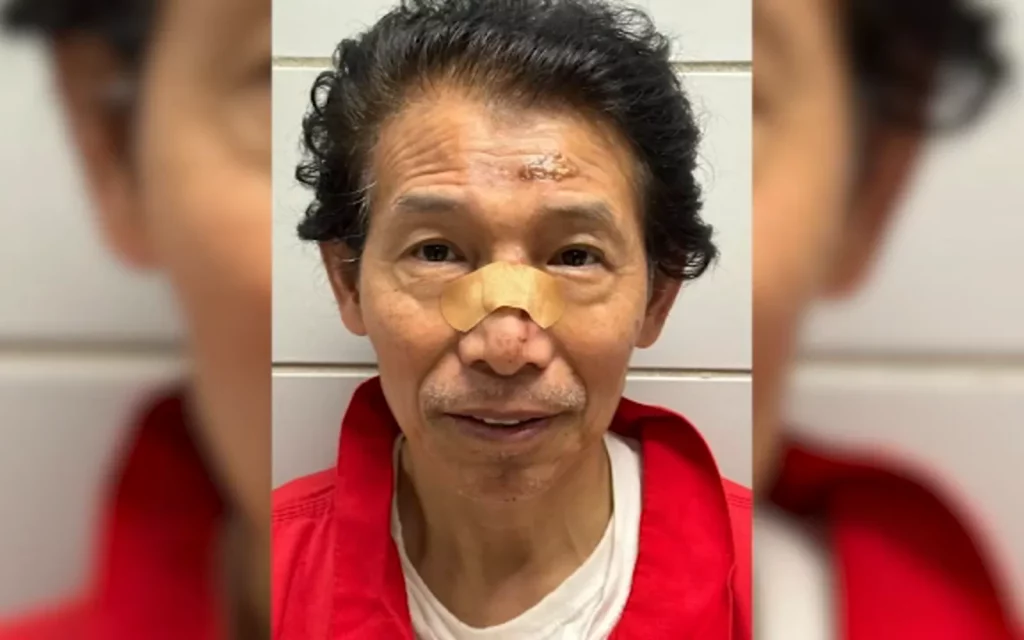
Jia Bei Zhu, the operator of the secret Reedley biolab, faces two more charges from federal prosecutors.
U.S. Attorney Phillip Talbert announced Thursday that Zhu, 62, is now also being charged with conspiracy and wire fraud.
The backstory: Zhu was already indicted on three counts last November by a federal grand jury over his involvement in the Reedley lab.
•He was charged with distributing adulterated and misbranded medical devices in violation of the federal Food, Drug, and Cosmetic Act and for making false statements to the Food and Drug Administration.
•Zhu operated companies Universal Meditech Incorporated and Prestige Biotech Incorporated from January 2020 to March 2023, producing COVID-19 tests and pregnancy tests without approval from the FDA.
•Zhu had stored a number of biological materials in the Reedley warehouse, which was eventually discovered by city code enforcement because of an unauthorized garden hose.
•The warehouse contained nearly 1,000 genetically engineered mice and viral agents such as malaria and HIV.
The big picture: A federal grand jury returned a 12-count superseding indictment on Thursday, which added the conspiracy and wire fraud charges.
•The grand jury also charges Zhu’s romantic and business partner, Zhaoyan Wang, 38, of China.
•According to federal authorities, Wang operated Universal Meditech and Prestige Biotech alongside Zhu.
Go deeper: Court documents state that Zhu and Wang conspired to defraud buyers of COVID-19 test kits from August 2020 through March 2023.
•They imported hundreds of thousands of COVID-19 test kits from Ai De Ltd., a Chinese company that they owned.
•They falsely represented to buyers that the test kits were made in the United States and illegally imported them without approval. They declared the COVID-19 test kits as pregnancy test kits, which they already had approval to import.
•Zhu and Wang also told buyers that they could make up to 100,000 COVID-19 test kits per week in the U.S. and that the tests were made with other labs that were certified by the Centers for Disease Control and Prevention.
•They also told buyers that the test kits were approved by the FDA.
—
Illegal Reedley biolab operator faces new charges
Federal grand jury charges Jia Bei Zhu and his business, romantic partner with conspiracy and wire fraud
REEDLEY – A federal grand jury brought additional charges against the operator of the illegal biolab in Reedley.
On Aug. 15, 2024, a grand jury in the U.S. District Court for the Eastern District of California charged Jia Bei Zhu (aka Jesse Zhu, Qiang He, and David He), 62, and his romantic and business partner, Zhaoyan Wang, 38, with conspiracy and wire fraud. If convicted, the two face up to 20 years in prison.
Zhu is already facing three years after he was indicted in November 2023 for distributing adulterated and misbranded medical devices. Zhe was also indicted for making false statements to federal authorities about his identity and his involvement with the lab. He faces up to five years stemming from these charges. Zhu remains in federal custody on the prior charges. Wang is not in custody.
According to the Aug. 15 indictment, Zhu and Wang owned and operated Ai De (Ai De) Diagnostic Co. LTD., which is located in China and United Meditech Incorporated (UMI) and Prestige Biotech Incorporated (PBI), which operated first in Tulare County, moved to Fresno and then relocated to Reedley. The indictment describes the three companies as alter egos of one another.
Starting at some time in 2020, but no later than August, and continuing until March 2023, Zhu and Wang conspired to defraud purchasers of UMI and PBI’s COVID-19 test kits by making false statements regarding the nature of the kits. According to the indictment, the two claimed the COVID kits were pregnancy kits. They did so because Ai De was not licensed to import COVID kits into the U.S. but was licensed to import pregnancy kits.
The indictment also states that Zhu and Wang maintained the fiction to buyers that their kits were manufactured in the U.S. when, in fact, the kits were manufactured in China. The two also lied about the number of COVID test kits UMI and PBI could manufacture, claiming the companies could turn out 100,000 kits in the U.S. This number was beyond the companies’ manufacturing capabilities. Zhu and Wang were aware of this fact; they were also aware that the kits would have to be imported from China in order to meet this quota.
UMI and PBI sold hundreds of thousands of test kits, none of which were approved by the Food and Drug Administration (FDA). The companies received in excess of $1,700,000 in payments for the kits. According to the indictment, many of these payments were made by interstate wire transfers coming from outside of California, which constituted wire fraud on a large scale.
An Aug. 15 press release from the U.S. Attorney’s Office for the Eastern District said Zhu’s next status conference is scheduled for Sept. 11, 2024. The release said that Wang is not in custody. It did not provide any information on when she will appear in court.
—
涉非法經營實驗室 中谷華男被控新罪名
加州中谷一名62歲中國籍男子,涉嫌新冠肺炎疫情期間非法經營生化實驗室和供應未經許可的新冠病毒快篩試劑,並向投資者說謊。聯邦大陪審團16日提出新起訴書,控以10多項罪名。
《沙加緬度蜂報》報道,聯邦大陪審團16日向佛斯盧縣(Fresno County)東加州聯邦地區法院提出新起訴書。
62歲男子Jia Bei Zhu(音譯︰朱家北) 2022年原被控3項共謀和電匯詐欺,現在控罪增至12項。
檢方表示,當非法實驗室被發現時,朱家北居住克洛維斯市(Clovis)。其38歲華裔女友兼生意夥伴Zhaoyan Wang(音譯︰王朝燕)也並列被告。
兩人代表律師尚未回應媒體查詢。
案情指出,兩人與屋崙一家有限合夥企業有關聯,後者擁有位於中加州里德利市(Reedley)市中心I街850號的物業,該物業被Universal Meditech Inc.和Prestige Biotech Inc.秘密使用。
那些公司被指將血液、病毒和其他傳染源的樣本存放在數十台冰箱裡,物業內還有實驗室化學品器皿、數百隻實驗室老鼠和一系列其他實驗室設備。
檢方指控,兩名被告於2020年8月到2023年3月詐騙新冠病毒快篩試劑的買家,據報從他們控制的中國公司「愛德」(Ai De Ltd)進口數十萬份快篩試劑,卻向買家訛稱試劑是美國製造。
檢察官指,為了將快篩試驗進口美國,兩人向監管人員訛稱那些是驗孕棒。
兩名被告被指向買家聲稱,經過聯邦疾控中心(CDC)的批准,他們每周可以在美國生產多達10萬份快篩試劑,還稱實驗室正在建造,以此避免向買家展示實驗室週邊環境。
根據聯邦司法部發出的新聞稿,朱家北繼續被收押等候審訊,王昭顏則未被收押。
朱家北的共謀和電匯詐欺控罪最高可處以20年刑期,供應摻假及錯誤標籤醫療器材則可處以3年。
本案下一次聆訊將於9月11日進行。
2024.8.7 SEC Charges Founder-Owners of Urban Commons LLC with Orchestrating Two Securities Fraud Schemes
Taylor Woods and Howard Wu
U.S. SECURITIES AND EXCHANGE COMMISSION
Litigation Release No. 26068 / August 7, 2024
Securities and Exchange Commission v. Taylor Woods, Howard Wu, Civil Action No. 2:24-cv-06633 (C.D. Cal. filed Aug. 6, 2024)
SEC Charges Founder-Owners of Urban Commons LLC with Orchestrating Two Securities Fraud Schemes
The Securities and Exchange Commission charged Taylor Woods and Howard Wu, the co-founders and co-owners of Urban Commons, LLC, with securities fraud involving two schemes to defraud two sets of investors related to investments in and ownership of thirteen hotels in the United States, including the historic Queen Mary. The two schemes resulted in over $70 million in investor losses.
According to the SEC’s complaint, in the first scheme, Woods and Wu fraudulently induced investors to sell their equity interests in the hotels to an entity Woods and Wu secretly controlled and would later use as part of a transaction, which Woods and Wu concealed from the investors, to publicly list the hotels in an overseas real estate investment trust (REIT). The Defendants made numerous alleged misrepresentations, including that they had lined up a third-party buyer for all the hotels and that investors would retain a security interest in the properties if that purported purchaser failed to make the purportedly required payments. The complaint further alleges the Defendants concealed from investors that payment for their equity interests was reliant on the success of a public listing. For a year, while working to launch the REIT that they had concealed from investors, Woods and Wu also lulled investors to prevent them from discovering the fraud or canceling the sale of their equity interests in the hotels as alleged in the complaint.
In a second scheme, perpetrated in 2021 after the REIT had filed for bankruptcy, the complaint alleges that Woods and Wu raised at least $1.775 million from a second set of investors to purchase the same hotels out of bankruptcy. The Defendants allegedly told investors that their funds would be held in escrow, used only to fund the hotels’ purchase, and returned to investors if the bid was unsuccessful. According to the complaint, even before their bid to buy the hotels was rejected, the Defendants misappropriated virtually all investors’ funds, using the bulk of the funds for personal and unrelated business expenses. Ultimately, Defendants failed to return at least $1.75 million to investors according to the complaint.
The SEC’s complaint, filed in the United States District Court for the Central District of California, charges the Defendants with violating Section 17(a) of the Securities Act of 1933 and Section 10(b) of the Securities Exchange Act of 1934 and Rule 10b-5 thereunder. The SEC seeks permanent injunctions, civil penalties, and disgorgement with prejudgment interest.
The SEC’s investigation was conducted by Edward B. Gerard and Matthew B. Reisig, with assistance from Derek Bentsen, who will lead the SEC’s litigation. The case was supervised by J. Lee Buck, David Nasse, and Melissa Hodgman.
Resources
SEC Complaint
https://www.sec.gov/files/litigation/litreleases/2024/comp26068.pdf
—
Former Queen Mary operators face securities fraud charges
Taylor Woods and Howard Wu were charged Tuesday by the Securities and Exchange Commission with two counts of securities fraud. According to the SEC, the pair — doing business as Urban Commons LLC — engaged in a pair of fraud schemes.
The former operators of the Queen Mary were facing federal fraud charges on Wednesday, Aug. 7, with regulators accusing them of bilking investors out of millions of dollars through schemes tied to their ownership of more than a dozen hotels, including the iconic Long Beach tourist attraction.
Taylor Woods and Howard Wu, whose attorneys couldn’t be reached for comment, were charged Tuesday by the Securities and Exchange Commission with two counts of securities fraud. The complaint was filed in federal court in downtown Los Angeles.
The duo — doing business as Urban Commons LLC — engaged in a pair of fraud schemes, according to the SEC. In the first, the criminal complaint says, they allegedly persuaded investors to sell their interests in the hotels, promising them profitable returns when the properties, including the Queen Mary, were sold to a third-party buyer.
But, prosecutors said in the complaint, the pair actually planned to retain ownership of the properties and list them in an overseas real estate investment trust, also called a REIT.
“In a second scheme, perpetrated in 2021 after the REIT had filed for bankruptcy, the complaint alleges that Woods and Wu raised at least $1.775 million from a second set of investors to purchase the same hotels out of bankruptcy,” according to the SEC. “The defendants allegedly told investors that their funds would be held in escrow, used only to fund the hotels’ purchase, and returned to investors if the bid was unsuccessful.”
Woods and Wu “misappropriated virtually all investors’ funds,” using the money mostly for business and personal expenses, prosecutors said.
Troubled operations
While Wood’s and Wu’s attorneys couldn’t be reached for comment on Wednesday, this isn’t the first time the pair have faced accusations of wrongdoing related to operating the Queen Mary and the other hotels — though they frequently denied any impropriety.
In September 2017, Urban Commons became the latest in a line of private Queen Mary operators — and they’d be the last.
The company initially signed a decades-long lease with Long Beach to operate the Queen Mary. The terms of that deal called for Urban Commons to pay $300,000 in annual rent, as well as provide the city with a portion of operating revenue, among other requirements.
The ship, though, was in disrepair, with a 2015 study finding the historic vessel could face some internal structural collapse unless there were major repairs. Some of those repairs cost millions of dollars more than expected.
In May 2020, the Queen Mary suspended operations because of the coronavirus. It would remain completely shuttered until 2022 — because critical repairs were needed to make the ship safe.
But Urban Commons wasn’t around to see the Queen Mary’s partial reopening in December 2022, let alone to see it finally turn a profit, which city officials have said will happen this year.
That’s because in January 2021, Urban Commons, as well as more than two dozen associated entities — all under the parent company called Eagle Hospitality Trust — filed for Chapter 11 bankruptcy.
Those subsidiaries, including Urban Commons, were associated with the various hotels that would eventually be named in this week’s SEC criminal complaint. (Urban Commons Queensway, for example, oversaw the Queen Mary while Urban Commons Cordova A oversaw the Sheraton Pasadena Hotel.)
“We have done everything in our power to unite during these uncertain times,” Urban Commons said in a statement at the time, “and work together amicably to facilitate the best chance to survival and success.”
Also in 2021, a report from Long Beach’s city auditor and bankruptcy filings accused Urban Commons of mismanaging the ship and of fraud, respectively. In the former, Urban Commons was accused of failing to keep detailed payment records related to $23 million the city gave the company to make critical repairs — though a 2023 city memo ultimately dispelled that allegation. The latter accused Urban Commons of fraud relating to loans from the pandemic-era, federal Paycheck Protection Program.
Urban Commons denied both accusations at the time.
The City of Long Beach regained control of the Queen Mary in 2021 when Urban Commons surrendered its leases for oversight of the then-deteriorating vessel.
“We will continue to work with the City of Long Beach to satisfy the City and the community,” Woods said in a May 26, 2021, statement about the city audit, “about our stewardship related to this majestic vessel.”
“There was never any intention to do anything inappropriate by any party involved,” he added about the PPP loans.
Then, in June 2021, Urban Commons surrendered its Queen Mary lease — giving Long Beach control of the ship for the first time in more than 40 years.
SEC complaint
And now, Wu and Woods face criminal charges, with the SEC seeking civil penalities and to bar them from securities trading.
But it’s unclear how big a role the Queen Mary plays in those charges.
The Queen Mary is only listed in the criminal complaint once — in a list of the 13 hotels at the heart of the allegations — and Long Beach isn’t mentioned at all.
The criminal complaint accuses Wu and Woods of two schemes that led investors to lose more than $70 million combined and “fraudulently induced” them to OK selling their investment interests — totaling about $169 million.
In the first scheme, as the complaint calls it, Wu and Woods convinced investors that they had lined up a third-party buyer for the hotels, including the Queen Mary, and that they would get a share of the profits of the sale if they OK’d it.
But, the complaint says, Wu and Woods owned and controlled that buyer.
What’s unclear from the complaint, however, is whether the pair told investors how much that sale would be — and what the value breakdown of each hotel was. While the Queen Mary seems like it would be the most valuable, Long Beach actually owns it and revenue was stymied by the ship being in disrepair.
Plus, Wu and Woods, the complaint says, floated that idea to investors in June 2017 — a couple of months before Urban Commons gained control of the Queen Mary.
Still, Wu and Woods had no intention of selling the hotels, the criminal complaint says. Instead, the pair formed Eagle Hospitality Trust to get the hotels under one entity; they used the investors consent, under the guise of a sale, to do so, the complaint says. That trust became the Singaport REIT, which was placed on the Singapore Stock Exchange on May 24, 2019.
Trading of the Singaport REIT was voluntarily suspended on March 23, 2020, the complaint says, and about 10 months later, the trust and its subsidiaries entered bankruptcy.
“As defendants well knew, there was no third-party buyer,” the complaint says. “Instead, the defendants at all relevant times owned and controlled the supposed third-party buyer. Defendants then intentionally exploited executed consent solicitations to consolidate as many of the thirteen hotels as possible for placement into a REIT for public listing in Singapore and assigned themselves a total of 15.2% of that REIT’s shares.”
—
SEC charges former Queen Mary operators with scamming investors out of $70 million


Three years after a series of Long Beach Post stories detailed the tangled financial web the Queen Mary’s inexperienced operators built in an attempt to prop up their doomed venture, the U.S. Securities and Exchange Commission has charged them with defrauding investors out of more than $70 million.
The charges filed Tuesday accuse real estate firm Urban Common’s co-founders Taylor Woods and Howard Wu of running two securities fraud schemes between 2019 and 2021 that relied on concealing risky and self-serving maneuvers from investors whom they placated with false guarantees of ever-growing returns.
An attorney for Wu denied any wrongdoing, saying the SEC’s case is based on a “lack of understanding how these transactions were structured.” Attorneys representing Woods couldn’t immediately be reached.
In the first alleged fraud, authorities say Woods and Wu promised investors a payday from the sale of their portfolio of hotels, including the Queen Mary’s lease, when, in reality, they secretly planned to retain control and list the properties in a public offering on a Singapore stock exchange.
This maneuver, according to the SEC, carried “significantly greater risk” that Woods and Wu concealed.
When the public offering collapsed amid concerns about the aging Queen Mary’s condition, the pair found more investors by pitching a plan to buy the ship’s lease and other hotel properties out of bankruptcy, the SEC alleges.
By falsely telling potential investors that they’d already secured hundreds of millions in financing, Woods and Wu managed to raise at least $1.775 million for their bid, according to the SEC.
The complaint alleges Woods and Wu misappropriated that money, “paying nearly $1 million to either themselves or to shore up their outside businesses, and using the remainder for legal and administrative expenses they had told investors they, rather than investors, would pay.”
Their bid was ultimately rejected, and the city of Long Beach, which owns the Queen Mary, was forced to take back control of the ship when nobody else sought to buy its lease out of bankruptcy.
After investing at least $45 million in repairs and improvements aboard the historic ocean liner, Long Beach says the ship has, years later, begun to turn an operating profit.
The city of Long Beach is not mentioned in the SEC’s charging papers. And questions remain about how Urban Commons spent $23 million in public money that officials provided for earlier repairs.
Unlike the investors the SEC claims were lied to about the risky Singapore stock exchange plan, Long Beach was aware and approved it.
City management signed off in 2019 after assurances that Woods and Wu would remain in control with “minimal to no disruption of the status quo.”
The SEC’s complaint is seeking the disgorgement of Woods and Wu’s allegedly fraudulent gains, civil penalties and permanent injunctions barring the two from the securities market.
—
以“玛丽皇后号”为局,洛杉矶华人富豪陷$7000万投资诈骗案
美国证券交易委员会(SEC)近日揭露一起跨国投资诈骗大案,前洛杉矶华人商业巨擘吴浩伟(Howard Wu)及其白人合伙人伍兹(Taylor Woods),因涉嫌通过操控多家酒店,包括标志性“玛丽皇后号”在内的资产,实施复杂金融欺诈,导致投资者血本无归,损失高达7000万美元!
SEC指控显示,吴浩伟与伍兹利用Urban Commons公司为幌子,精心编织了两大骗局。首先,他们向投资者虚假承诺已为包括“玛丽皇后号”在内的13家酒店找到高价买家,诱骗投资者投资,实则却将这些酒店打包成房地产投资信托基金(REIT)在新加坡上市圈钱。而随着债务问题曝光,该REIT股价暴跌,最终破产。
然而,破产并未让这两人就此收手,反而再次以竞标破产资产为由,从无辜投资者手中骗取至少177.5万美元,资金最终流向个人腰包,投资者惨遭背叛。
据报道,此案波及范围广泛,不仅有普通投资者深受其害,更有通过EB-5项目寻求美国绿卡的中国投资者也未能幸免,陷入这场精心设计的骗局之中……
SEC明确表示,吴浩伟与伍兹的行为已构成严重违法,将坚决追求法律责任,包括申请永久性禁令,禁止两人再次涉足证券行业。
面对如山铁证,两人的律师虽试图以交易结构误解及疫情为借口辩护,但种种证据表明,两人作案的心思早已预谋已久。
而在早之前,长堤市政府的警告、国税局的税收留置等种种迹象,也预示了这场风暴的来临。
回望过去,Urban Commons对“玛丽皇后号”的雄心勃勃改造计划曾令人瞩目,但终因管理不善、欺诈行为而破产收场。
2024.8.5 Lubbock Police Department has seen an alarming amount of scam calls being made in the past couple of weeks. They told this has resulted in many people losing thousands of dollars.
LPD warns of multiple scams involving Bitcoin, gift cards
LUBBOCK, Texas (KCBD) – Lubbock police have reported a recent increase in scams, with some victims losing thousands of dollars.
LPD has had 20 to 30 people coming to headquarters to report the scams over the last two to three months. The scams involve gift cards to bitcoin.
Police say hackers typically target the elderly, claiming an account is hacked and they will need access to verify that person has been “compromised.”
The scammers then say in order to protect the account, the victim needs to write a check, withdraw that money from their bank account and deposit those funds into a bitcoin machine.
Sgt. Brandon Stewart explained a recent situation where an individual transferred $25,000 wirelessly, then immediately transferred another $30,000.
Stewart warns if a scam like this takes place, the money sent will likely never be returned.
“These scammers are probably not even in the country,” Stewart said. “(It’s) to the point where any leads to an investigation are gone, they’re just lost.”
Stewart adds if something seems suspicious, people should trust that feeling.
“Rely on your gut feeling; some of the red flags we’re seeing are the fact that these scammers are telling the victims to stay on the phone. ‘Write yourself a check, go to the bank, but stay on the phone with me,’” Stewart said. “Nobody in their right mind is gonna tell you to stay on the phone while you go and make a financial transaction at a bank.”
LPD has these tips to pinpoint the warning signs of a scam:
First, know the police department will never contact anyone to tell them they owe money.
Second, if someone says not to get off the phone while making purchases, this is a major red flag and people should hang up the phone immediately.
Lastly, people can call the actual agency or organization these scammers claim to be with to verify if what they are saying is accurate.
LPD hopes these tips can help people avoid suffering life-changing scams.
“It’s one thing to get scammed out of a hundred dollars,” Stewart said. “But when you’re dropping some of these people’s life-savings, $60-$70,000 dollars, whatever the case may be, that’s a big concern that we have for the public.”
—
Lubbock Police Department warns public about scam taking thousands from citizens
LUBBOCK, Texas — Lubbock Police Department has seen an alarming amount of scam calls being made in the past couple of weeks. They told this has resulted in many people losing thousands of dollars.
LPD said scammers are not only getting your money by pretending to be law enforcement, but now they are also doing it by pretending to be recognizable brands such as Amazon, Netflix and Apple.
The scammers are calling and saying the individual they are contacting has been hacked on one of these platforms and the only way to receive their account back is to wire money and gifts cards and buy Bitcoin.
LPD said scammers do not discriminate on who they get money from, but Sergeant Brandon Stewart said one group is falling victim to it more than others: the elderly.
Sgt. Stewart said the past couple of weeks they have reported close to 30 cases with these types of scams.
“It’s been exponential. It’s been to the point where it’s been $4,400 taken and then it jumped up to $20,000 and all the way up to $60,000,” Sgt. Stewart said. “There was one example that we had where $25,000 was transferred wirelessly, and then immediately after that, another $30,000.”
Sgt. Stewart said if anyone gets a call from an unknown number claiming to be a recognizable brand or law enforcement asking for any form of payment, hang up the phone immediately and call LPD to report the call.
—
德克萨斯州拉伯克警方称,比特币相关诈骗案件显著增加,受害者损失惨重。过去几个月中,已有 20 到 30 人举报涉及礼品卡和比特币交易的诈骗案件。
诈骗犯通常针对老年人,声称他们的账户已被盗用,需要进行验证。受害者被指示写支票、提取现金,并将资金存入比特币机器。布兰登·斯图尔特警官回忆了一起案件,其中一名受害者先后转账 2.5 万美元和 3 万美元。
斯图尔特警告说,如果发生这样的骗局,汇出的钱很可能永远不会退还。
“这些骗子可能根本不在国内,”斯图尔特说。“(情况)已经到了调查线索消失的地步。”
斯图尔特补充说,如果某件事看起来可疑,人们应该相信这种感觉。
“相信你的直觉;我们看到的一些危险信号是这些骗子告诉受害者不要挂电话。‘给自己开张支票,去银行,但要一直和我保持通话,’”斯图尔特说。“没有一个心智健全的人会告诉你在去银行进行金融交易时不要挂电话。”
LPD 提供了以下提示来帮助您识别诈骗的警告信号:
首先,要知道警察局永远不会联系任何人告诉他们欠钱。
其次,如果有人说在购物时不要挂断电话,这是一个严重的危险信号,人们应该立即挂断电话。
最后,人们可以致电这些骗子所声称的实际机构或组织,以核实他们所说是否准确。
LPD 希望这些提示可以帮助人们避免遭受改变生活的骗局。
“被骗走一百美元是一回事,”斯图尔特说。“但当你损失了这些人的毕生积蓄,六七万美元时,无论情况如何,这都是我们为公众担心的一大问题。”
—

发表回复